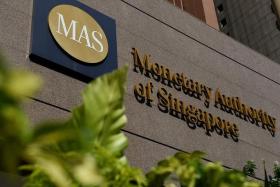MAS tightens Singdollar policy to counter rising inflation
In a surprise out-of-cycle move, Singapore's central bank on Tuesday (Jan 25) tightened monetary policy to allow for a faster appreciation of the local currency to combat rising inflation.
The Monetary Authority of Singapore (MAS) did so by raising slightly the "slope" or rate of appreciation of its Singapore dollar policy band. The width of the policy band and the level at which it is centred remained unchanged.
"This move builds on the pre-emptive shift to an appreciating stance in October 2021 and is appropriate for ensuring medium-term price stability," MAS said.
MAS manages monetary policy through exchange rate settings, rather than interest rates, letting the Singapore dollar rise or fall against the currencies of its main trading partners within an undisclosed policy band.
It adjusts its policy in three ways: the slope, mid-point and width of the policy band, known as the nominal effective exchange rate, or S$Neer.
"MAS had assessed that a shift in its policy stance was necessary to ensure price stability in light of accumulating external and domestic cost pressures, even as the strength of the economic recovery remained uncertain," it added.
The tightening came a day after data showed Singapore core consumer prices or core inflation in December rose by the fastest pace in nearly eight years.
On Tuesday, MAS also raised its forecasts for inflation this year.
It now sees core inflation at 2 per cent to 3 per cent in 2022, from the 1 to 2 per cent expected in October last year. Overall inflation is seen at 2.5 per cent to 3.5 per cent, from the earlier forecast range of 1.5 to 2.5 per cent.
Get The New Paper on your phone with the free TNP app. Download from the Apple App Store or Google Play Store now



